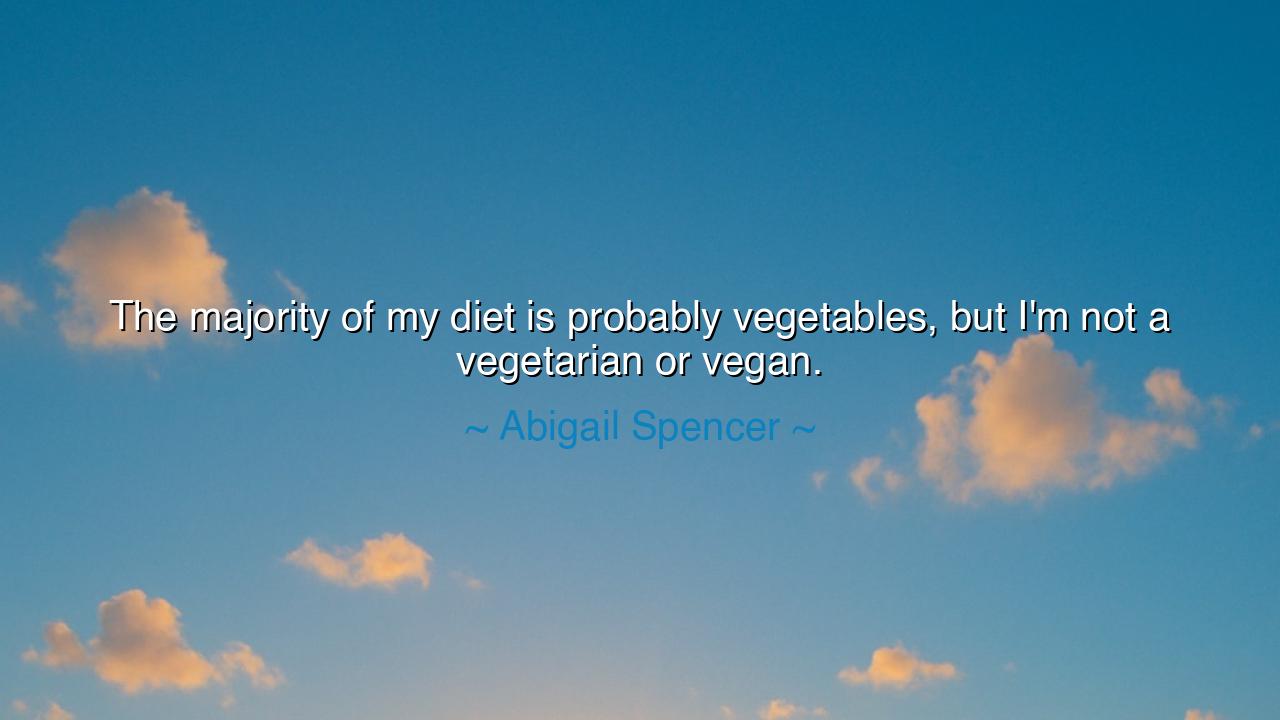
The majority of my diet is probably vegetables, but I'm not a






In the tapestry of life, there are many threads woven together to form a whole, and so too is the way we nourish our bodies. Abigail Spencer speaks plainly, but with great insight: "The majority of my diet is probably vegetables, but I'm not a vegetarian or vegan." In these few words, she touches upon the timeless balance that has guided the greatest minds and bodies throughout history—the understanding that nourishment must be both diverse and purposeful, combining the best of nature’s offerings while maintaining flexibility and a respect for what the body requires.
The ancients, from the philosophers of Greece to the healers of India, understood that the key to a life of vitality was not found in strict adherence to any one doctrine or ideology but in the balance of all things. The wise philosopher Hippocrates, known as the father of medicine, taught that we should “Let food be thy medicine, and medicine be thy food.” Yet, he did not prescribe a one-size-fits-all approach to diet. He understood that the human body requires a variety of foods, and that no single source of nourishment should dominate. Spartans, famed for their might, ate a diet that was rich in meat, but also included vegetables and grains—understanding that the body needed both strength and sustainability. Abigail Spencer’s approach mirrors this ancient wisdom: a balanced diet that honors the body’s natural need for both plant-based nourishment and the richness of animal products.
Just as Socrates lived not in excess, but in a way that nurtured the mind and body, so too does Spencer embrace moderation and balance in her own life. The vegetables she consumes provide her with the essential vitamins, minerals, and fiber needed for physical vitality, but she does not fall into the trap of extremes—refusing to label herself as a vegetarian or vegan. This reflects an ancient understanding that balance, not dogma, is the path to true well-being. To be overly rigid in one’s approach to nourishment—whether by refusing certain foods or overindulging in others—would be to fail to honor the body’s natural desires and needs. It is the flexibility to adapt and to nourish oneself from a wide range of sources that strengthens both the body and the spirit.
Consider the Roman soldiers, who, though they conquered vast empires, also knew the power of the simple diet. Their meals, like those of the ancient Greeks, were largely composed of vegetables, grains, and legumes—foods that sustained their bodies during long campaigns, allowing them to fight with strength and endurance. However, the Romans did not reject the benefits of meat, knowing that the body required the protein and strength that animal products provided for their grueling physical endeavors. The great Julius Caesar himself, a man of extraordinary ambition and achievement, was said to have embraced a balanced diet, one that combined vegetables, fruits, and the occasional meat—providing him with the energy needed to lead armies and create an empire.
It is this very balance that Abigail Spencer invokes with her admission that while she consumes mostly vegetables, she does not feel the need to define herself by the labels of vegetarianism or veganism. She acknowledges the importance of vegetables in providing health and vitality, but she also recognizes that the human body is complex and requires a variety of nourishment to function at its best. The lesson here is not one of dietary dogma, but one of flexibility—the ability to honor the body’s needs without succumbing to the extremes that often dominate modern discourse on diet.
The ancient wisdom, passed down through generations, teaches us that the whole of life is a matter of balance. The body is not meant to be limited by narrow labels or restrictive ideals. Instead, it should be nourished by a variety of wholesome foods that allow it to thrive—foods that nourish not just the body, but the mind and the spirit. In this, Spencer’s approach is a modern reflection of the wisdom of the ancients: a healthy diet need not be extreme but can be composed of variety and balance, always adapting to the needs of the body.
Thus, the lesson to be learned from Abigail Spencer and the teachings of the ancients is clear: true health comes not from rigid labels or extremes, but from a mindful and balanced approach to nourishment. Let us honor the variety of nature's offerings and nourish our bodies with what is whole, real, and sustaining. Just as the greatest minds of the ancient world embraced balance in all things, so too can we find our strength in a diet that reflects the diversity and moderation of life itself. In this pursuit, we find not just health, but the wisdom to live fully, embracing all that the earth has to offer.






AAdministratorAdministrator
Welcome, honored guests. Please leave a comment, we will respond soon